spine like a cobra in it for the okra ( ̄へ ̄井) lastfm | trntblformerly anywbb
Don't wanna be here? Send us removal request.
Photo
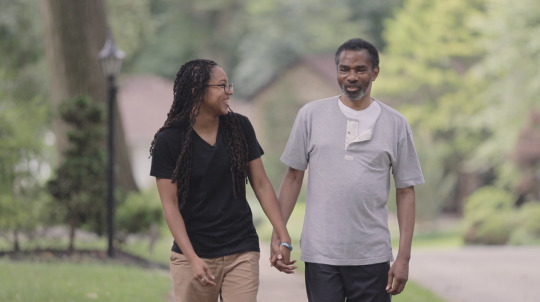
My father Lincoln has been battling the effects of Alzheimer’s for almost 7 years, but now his memory is quickly fading and he’s worried about the future. It’s not enough for me to tell him that we’ll be okay; I need to show him.
So I’ve started the Drive for Dad project to fundraise for Alzheimer’s research as well as repay my dad for putting me through school. I think it’s the best way that I can honor his spirit & his fight.
Please help me to bring a smile to Dad’s face by donating here or by taking a free ride with Lyft! Your free ride will automatically make a one time $10 donation to this project, however this code is exclusive to new Lyft users.
Thank you so much for your support. My family and I truly appreciate it. 🙏🏽
796 notes
·
View notes
Text
isn’t it weird how the US not only has a hugely large prison population and that we also make it illegal for felons to vote even after they have been rehabilitated by prison (which is actually not the case in like canada or europe where even inmates are allowed to vote apparently)? so we have effectively taken millions of people out of the voting pool and that group of people is overwhelmingly poor and are mostly people of color?
I just looked up stats: we have over 20% of the worlds prison population in the US alone. 1/31 adults is under some form of correctional control. 58% of the US prison population are African American or Hispanic people even though those groups combined make up only 25% of the United states population. The NAACP estimates that if trends continue 1/3 black men alive today could expect to spend time in prison in their lifetimes… thats 1/3 black men who wouldn’t be allowed to vote. thats a pretty sick facet of the prison industrial complex that i don’t see addressed often. Apparently the technical term for it is “felon disenfranchisement”.
36K notes
·
View notes
Quote
When a Western soldier suffers from post-traumatic stress disorder, there are doctors and organisations who can help them recover… When it is someone from Afghanistan, where bombings regularly wreak devastation and tear families apart, you are unlikely to find any assistance, since there is little understanding of mental illness in the country. “The most common treatment is to take your loved one to a religious shrine where they are chained to walls or trees for up to 40 days, fed stale bread, water and ground pepper, and read dubious lines from the Qur’an by individuals with no medical or, for that matter, religious training,” documentary-makers Jamie Doran and Najibullah Quraishi told news.com.au. Many of the shrines are nothing more than money-making enterprises run by con artists with little or no religious training. The filmmakers hope their footage of the inhumane businesses will force uninterested police and government officials to act. You might have thought that civilians and soldiers living in war zones would become hardened to this life, and find it almost normal. In fact, the pervasive atmosphere of violence and fear takes a bitter toll, and this terrible truth can be seen most clearly in Afghanistan, the site of the longest war ever for Australia and the US. “When you talk to them, there is little joy in their words any more,” said UK-based director Doran, after filming Living Beneath Drones for Al Jazeera in the region. “Anyone with a family, children, someone you love, is forever in fear of losing them. You can see it in their worn faces.” Hope and confidence in the future had steadily dissolved, with millions now thought to be suffering from PTSD, with little hope of treatment. Only one hospital in the entire country is dedicated to mental health, despite official estimates indicating that 60 to 70 per cent of the country’s population now suffer from some mental health problem. Unofficial estimates go as high as 95 per cent. This is the real human impact of living with the daily threat of death. “Over the past 14 years or so, I have sensed and experienced a discernible change in Afghans,” added Doran. “They’re still beautiful people, but they’re also angry and confused.” Directors Doran and Afghanistan-based Quraishi wanted to lay bare the stark facts about the mental toll inflicted on those who live in the world’s most heavily drone-bombed country, and how debilitating the psychological problems can be even for those who are not physically injured. Unmanned drones are a dangerous and frightening force. More than 1000 are known to have hit targets in the past five years, but there is no record of when and where the strikes took place, what they destroyed, or who they killed. “In the cities, a suicide bomber or Taliban unit can attack at any time,” said the filmmakers. “You may simply be travelling to your place of work at the usual time or having a cup of tea at a cafe when an attack occurs. It’s the uncertainty that affects everyone in urban areas. But imagine living in a remote village with your family and the drones begin circling in search of armed men on the ground. It can happen several times every single day.” Neither believe that civilian casualties are intentional, but remotely-controlled weapons can easily harm the wrong person or place in innocent communities. “To watch children screaming, running to their homes in utter fear, is heartbreaking. But very often it’s the women, the mothers and daughters, who suffer most. Mostly, they must suffer in silence, such is the stigma attached to females with mental health issues. Many take their own lives.” Doran and Quraishi say Afghanistan is a “broken country” and worse than it has ever been, as once close-knit communities fall apart under the pressure. Many have left their villages for refugee camps elsewhere in the country, seeking homes that are relatively safe and peaceful - places that are few and far between. “The allied nations that invaded - or liberated, as some still claim - Afghanistan at the beginning of the 21st century have managed to leave an even bigger mess than they inherited. “An entire generation brought up in daily fear of death does not augur well for either their future or ours. It may not be entirely fair, but they blame the West and allied nations for the state of their country. Expect some of them, at least, to seek revenge in the years to come.” No one wants to take responsibility for the tragedy in Afghanistan, but perhaps this dire warning for the world could make us take notice.
RAWA, Deep trauma of life beneath the drones. (via bisharm)
141 notes
·
View notes
Photo
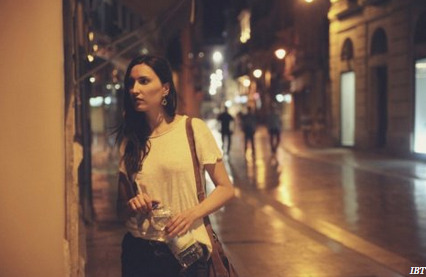
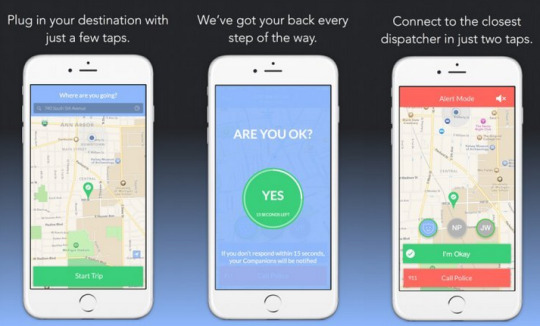
A New App That Lets Users’ Friends ‘Virtually Walk Them Home At Night’ Is Exploding In Popularity
Tens of thousands of people around the world are now using a free personal-safety mobile app that allows friends to virtually walk you home at night.
The Companion app, created by five students from the University of Michigan, enables users to request a friend or family member to keep them company virtually and track their journey home via GPS on an online map.
Although they can do so, the friend or family member does not need to have installed the Companion app. The user can send out several requests to different phone contacts in case people are not available to be a companion or not with their phones at the time.
Those contacted then receive an SMS text message with a hyperlink in it that sends them to a web page with an interactive map showing the user walking to their destination. If the user strays off their path, falls, is pushed, starts running, or has their headphones yanked out of their phone, the app detects these changes in movement and asks the user if they’re OK.
If the user is fine, they press a button on the app to confirm within 15 seconds. If they do not press the button, or a real emergency is occurring, the Companion app transforms the user’s phone into a personal alarm system that projects loud noises to scare criminals from the scene, and gives you the option to instantly call the police.
(Source)
155K notes
·
View notes
Text
So far as we feel sympathy, we feel we are not accomplices to what caused the suffering. Our sympathy proclaims our innocence as well as our impotence. To that extent, it can be (for all our good intentions) an impertinent- if not inappropriate- response. To set aside the sympathy we extend to others beset by war and murderous politics for a reflection on how our privileges are located on the same map as their suffering, and may- in ways we might prefer not to imagine- be linked to their suffering, as the wealth as some may imply the destitution of others, is a task for which the painful, stirring images supply only an initial spark.
― Susan Sontag, Regarding the Pain of Others
493 notes
·
View notes
Photo
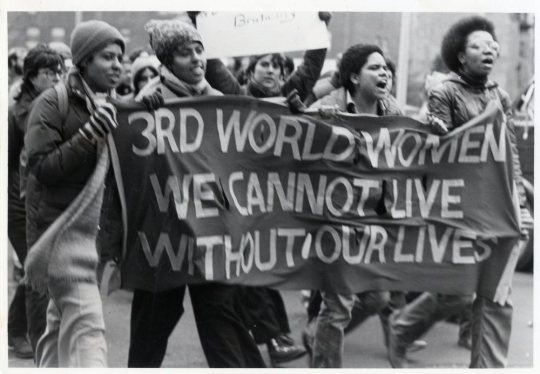
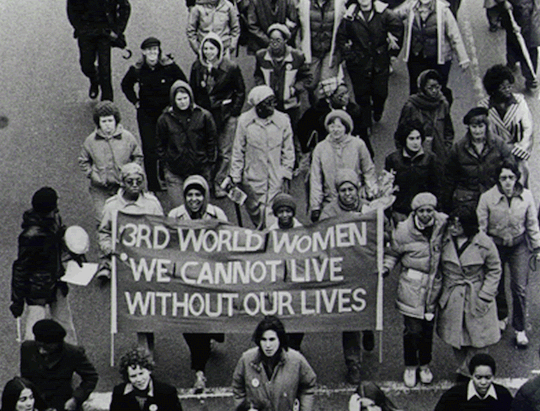
Members of the Combahee River Collective join a march to protest the murders of black women, Boston, 1979.
3K notes
·
View notes
Link
Chelian is now 64 and has two grown daughters. She’s the founder and CEO of Northland Family Planning Center, a group of three clinics that perform abortions in the Detroit suburbs. A petite woman with a blunt haircut and a round face, Chelian is matter-of-fact and seemingly unflappable. But when we talk about her clinics, her tone intensifies. Her business is under constant threat of closure from the conservative Michigan Legislature, which has spent the past four years churning out a string of arbitrary new abortion restrictions designed to shut clinics like Northland down. One proposal required Northland to have one bathroom for every six patients.
“Sometimes, I feel like I’ve gone back 40-some years,” she says. “And I can hardly believe that.” Women trek hundreds of miles north from Dayton, Ohio, or east from South Bend, Indiana, for an abortion at one of her centers. Some are already miscarrying—probably after taking pills or herbal concoctions they got from the internet. A few have tried to open their cervix by digging into it with a sharp object.
This is what 2015 looks like: Abortion providers struggle against overwhelming odds to stay open, while women “turn themselves into pretzels” to get to them, as one researcher put it. Activists have been calling it the “war on women.” But the onslaught of new abortion restrictions has been so successful, so strategically designed, and so well coordinated that the war in many places has essentially been lost.
Most abortions today involve some combination of endless wait, interminable journey, military-level coordination, and lots of money. Roe v. Wade was supposed to put an end to women crossing state lines for their abortions. But while reporting this story, I learned of women who drove from Kentucky to New Jersey, or flew from Texas to Washington, DC, because it was the only way they could have the procedure. Even where laws can’t quite make it impossible for abortion clinics to stay open—they are closing down at a rate of 1.5 every single week—they can make it exhausting to operate one. In every corner of America, four years of unrelenting assaults on reproductive rights have transformed all facets of giving an abortion or getting one—possibly for good.
“Every day is just frightening,” Chelian said. “I think things are bad, and then they get worse somewhere else. And you go, ‘Oh my God, it could be worse.’ And I go to sleep with that. I wake up with that.”
2K notes
·
View notes
Link
Gerardo Corrales, a 19 year old paralyzed from the chest down who uses a wheelchair, out of the hellhole for-profit Adelanto immigration prison where he’s experienced extreme medical abuse at the hands of ICE and the GEO Group prison company. He’s finally been granted bond, but it is $10,000. His family is working class and just doesn’t have that kind of money. His sister-in-law Tanya started a fundraiser on GoFundMe to raise the money to finally bring him home. PLEASE DONATE AND SHARE WIDELY. Him being trapped another day away from his mother because of a lack of money is just wrong.
Gerardo is part of the Adelanto4!
Anything and everything helps!
332 notes
·
View notes
Photo
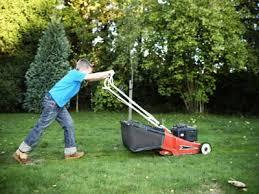

Even little kids have a wage gap
Boys, on average, spend two fewer hours doing household chores per week than girls do (they play two hours more).
If they live in households where children are compensated for doing chores, boys make and save more money.
A 2009 study conducted by University of Michigan economists found a two-hour gender disparity in responsibilities per week in a study of 3,000 kids.
75 percent of girls had chores, while just 65 percent of boys do
This disparity in chores and free time continues into adulthood all over the world. According to the Organisation of Economic Co-operation and Development (OECD), men “report spending more time in activities counted as leisure than women. Gender differences in leisure time are wide across OECD countries.”
Year after year, studies repeatedly confirm these patterns.
The problems women face with unequal pay and housework duties actually start in childhood.
The fact that boys’ chores appear to be more profitable makes the childhood chore gap even more disturbing. Turns out, parents tend to value the work that boys do more.
Gender stereotypes dictate these patterns.
men who grow up with sisters do less housework than their spouses and are also significantly more socially conservative.
196K notes
·
View notes
Text
Migrants Welcome
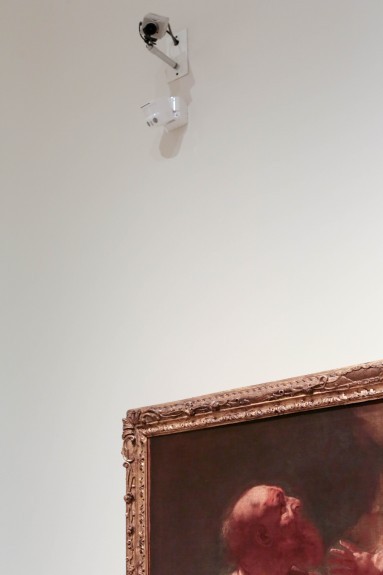
By TEJU COLE
1 I’ve been reading the later work of Derrida, in which the intensity about language remains but there’s also a turn towards the thorniest questions of ethics. There’s a remarkable passage in “The Gift of Death” (1995) that gets at something the news isn’t touching on:
“…because of the structure of the laws of the market that society has instituted and controls, because of the mechanisms of external debt and other comparable inequities, that same ‘society’ puts to death or (but failing to help someone in distress accounts only for a minor difference) allows to die of hunger and disease tens of millions of children…without any moral or legal tribunal ever being considered competent to judge such a sacrifice, the sacrifice of the other to avoid being sacrificed oneself. Not only does such a society participate in this incalculable sacrifice, it actually organizes it.”
2 I’m seeing a lot of writing about not calling refugees “migrants.” This is in reaction to those who say refugees are “only” migrants, that this “flood” of migrants flows to richer countries for economic benefit. And it’s true that there’s an urgency in the condition of refugees (no one growing up thinks this will be their fate: to be a refugee, at the crucial mercy of others), and what is specially awful about being a refugee must be recognized and acted on, and not simply reduced to money.
But here’s the thing: migrants should be welcome too. Migrants are welcome. Some of the refugees become migrants, once the immediate danger is past. Some migrants become refugees, caught in an unexpected vortex of malice. Don’t let yourself be spun into a language of hatred and exclusion, at this hot moment in which it’s deemed OK to support refugees but still condemn migrants.
I say refugee, I say migrant, I say neighbor, I say friend, because everyone is deserving of dignity. Because moving for economic benefit is itself a matter of life and death. Because money is the universal language, and to be deprived of it is to be deprived of a voice while everyone else is shouting. Sometimes the gun aimed at your head is grinding poverty, or endless shabby struggle, or soul crushing tedium.
And more than “refugee” or “migrant,” I say “people,” and say it with compassion because everyone I love, and everyone they love has at some point said tearful goodbyes and moved from place to place to seek new opportunities, and almost all of them have by their movement improved those new places. Because I reject the poverty of a narrowly defined “we” that robs me of human complexity. Because I don’t believe that radical inclusivity is going to destroy “our” way of living, when I generally don’t know what “our” you’re talking about, and when I think we can do much better than this malevolent way of living anyway.
Did all sixteen of your great great grandparents live, work, and die in the same town where you now live? If no, then you’re a child of migrants. If yes, then y’all seriously need to get out more.
“OK, but where do we draw the line?” is a question you create in your head to distract you from your human duty to the other. If the line had been drawn in front of you instead of behind, you wouldn’t even be here now, wherever here might be.
We have to begin finding ways of dismantling this form of society that actively and passively organizes mass death and then, at the faintest flash of humane behavior, throws itself into paroxysms of self-congratulation.
-Teju Cole, “Migrants Welcome”
560 notes
·
View notes
Text
Can you feel sympathy for a people whose struggle hasn’t been sensationalized? Is your concern actually for the wellbeing of a people whose struggle / has/ been sensationalized? Or is it liberal boredom and a guilty conscience that fuels your cheap concern. Can you understand, on your own, when a cause is righteous and when it is not? Who the oppressor is? Will you scoff at someone’s struggle if you have been misinformed about their history and make no attempt to understand? Are your attempts to understand attempts to intrude? Do you want to help others or speak for others? Do you want to see others liberated or do you want to liberate yourself from guilt and responsibility? Do you think you’ll be absolved by your opinions or your actions? Questions you should ask yourself before you insert yourself into another discussion about a country or group of people you will never live in or be part of.
9K notes
·
View notes
Text
More ways to help the refugees
I would like to add more ways (apart from those mentioned here) in how you can help the refugees.
- The Aylankurdi fund. It was created today and takes its name from the kurdish boy who was found drowned.
- The Jesuit service for the refugees are also working with Syrians who have fled their homes not only in Europe but other places of the middle east. They are especially active in France, Malta and Portugal.
- You can donate to Unicef.
- And of course, to the Red Cross.
Apart from Amazon, there’s a way you can donate a part of the money of the stuff you sell online.
- The Guardian has this helpful list about more stuff you can do help
- And the Independent also published this very interesting and helpful article about what you can do. This includes:
● The Jungle Library: makeshift library set up at the camp at Calais. They need more books
● Avaaz.org: lobbying local councils, providing language support, housing refugees
● Migrant Offshore Aid Station: dedicated to preventing loss of life at sea
● ‘Childhood bags’: fundraising to take books, toys and warm clothes to children
● Folkestone United: organising protests, taking donated goods to Calais in September
● Glasgow Solidarity with Calais Migrants: Diane and Bob are driving to Calais with supplies
● Sawa4Syria: working with Syrian refugees in Lebanon
Also I urge everyone to research their national refugee council or similar institution. There’s CIRÉ in France, Refugee Council in Britain, CEAR in Spain, the Flüchtlingszentrum in Germany and basically every country has a similar department whether it’s state owned or not. Many of the people who are coming and staying will need a house (in countries such as Germany and Portugal communities have offered to house them). These centres will also tell you how to donate food, furniture, clothes, meds etc. it has also been brought to my attention that many refugees will need language lessons so if you are a qualified teacher you can volunteer. In fact, many of these centres are looking for volunteers. You can also try to look into your local council/community to see what they can do to help.
5K notes
·
View notes
Link
Once slavery was abolished in 1865, manufacturers scrambled to find other sources of cheap labor—and because the 13th amendment banned slavery (except as punishment for crimes), they didn’t have to look too far. Prisons and big businesses have now been exploiting this loophole in the 13th amendment for over a century.
“Insourcing,” as prison labor is often called, is an even cheaper alternative to outsourcing. Instead of sending labor over to China or Bangladesh, manufacturers have chosen to forcibly employ the 2.4 million incarcerated people in the United States. Chances are high that if a product you’re holding says it is “American Made,” it was made in an American prison.
On average, prisoners work 8 hours a day, but they have no union representation and make between .23 and $1.15 per hour, over 6 times less than federal minimum wage. These low wages combined with increasing communication and commissary costs mean that inmates are often released from correctional facilities with more debt than they had on their arrival. Meanwhile, big businesses receive tax credits for employing these inmates in excess of millions of dollars a year.
While almost every business in America uses some form of prison labor to produce their goods, here are just a few of the companies who are helping prisoners pay off their debt to society, so to speak.
Whole Foods. The costly organic supermarket often nicknamed “Whole Paycheck” purchases artisan cheese and fish prepared by inmates who work for private companies. The inmates are paid .74 cents a day to raise tilapia that is subsequently sold for $11.99 a pound at the fashionable grocery store.
McDonald’s. The world’s most successful fast food franchise purchases a plethora of goods manufactured in prisons, including plastic cutlery, containers, and uniforms. The inmates who sew McDonald’s uniforms make even less money by the hour than the people who wear them.
Wal-Mart. Although their company policy clearly states that “forced or prison labor will not be tolerated by Wal-Mart”, basically every item in their store has been supplied by third-party prison labor factories. Wal-Mart purchases its produce from prison farms where laborers are often subjected to long, arduous hours in the blazing heat without adequate sunscreen, water, or food.
Victoria’s Secret. Female inmates in South Carolina sew undergarments and casual-wear for the pricey lingerie company. In the late 1990’s, 2 prisoners were placed in solitary confinement for telling journalists that they were hired to replace “Made in Honduras” garment tags with “Made in U.S.A.” tags. Victoria’s Secret has declined to comment.
Aramark. This company, which also provides food to colleges, public schools and hospitals, has a monopoly on foodservice in about 600 prisons in the U.S. Despite this, Aramark has a history of poor foodservice, including a massive food shortage thatcaused a prison riot in Kentucky in 2009.
AT&T. In 1993, the massive phone company laid off thousands of telephone operators—all union members—in order to increase their profits. Even though AT&T’s company policy regarding prison labor reads eerily like Wal-Mart’s, they have consistently used inmates to work in their call centers since ’93, barely paying them $2 a day.
BP. When BP spilled 4.2 million barrels of oil into the Gulf coast, the company sent a workforce of almost exclusively African-American inmates to clean up the toxic spill while community members, many of whom were out-of-work fisherman, struggled to make ends meet. BP’s decision to use prisoners instead of hiring displaced workers outraged the Gulf community, but the oil company did nothing to reconcile the situation.
From dentures to shower curtains to pill bottles, almost everything you can imagine is being made in American prisons. Also implicit in the past and present use of prison labor are Microsoft, Nike, Nintendo, Honda, Pfizer, Saks Fifth Avenue, JCPenney, Macy’s, Starbucks, and more. For an even more detailed list of businesses that use prison labor, visit buycott.com, but the real guilty party here is the United States government. UNICOR, the corporation created and owned by the federal government to oversee penal labor, sets the condition and wage standards for working inmates.
One of the highest-paying prison jobs in the country? Sewing American flags for the state police.
42K notes
·
View notes
Photo
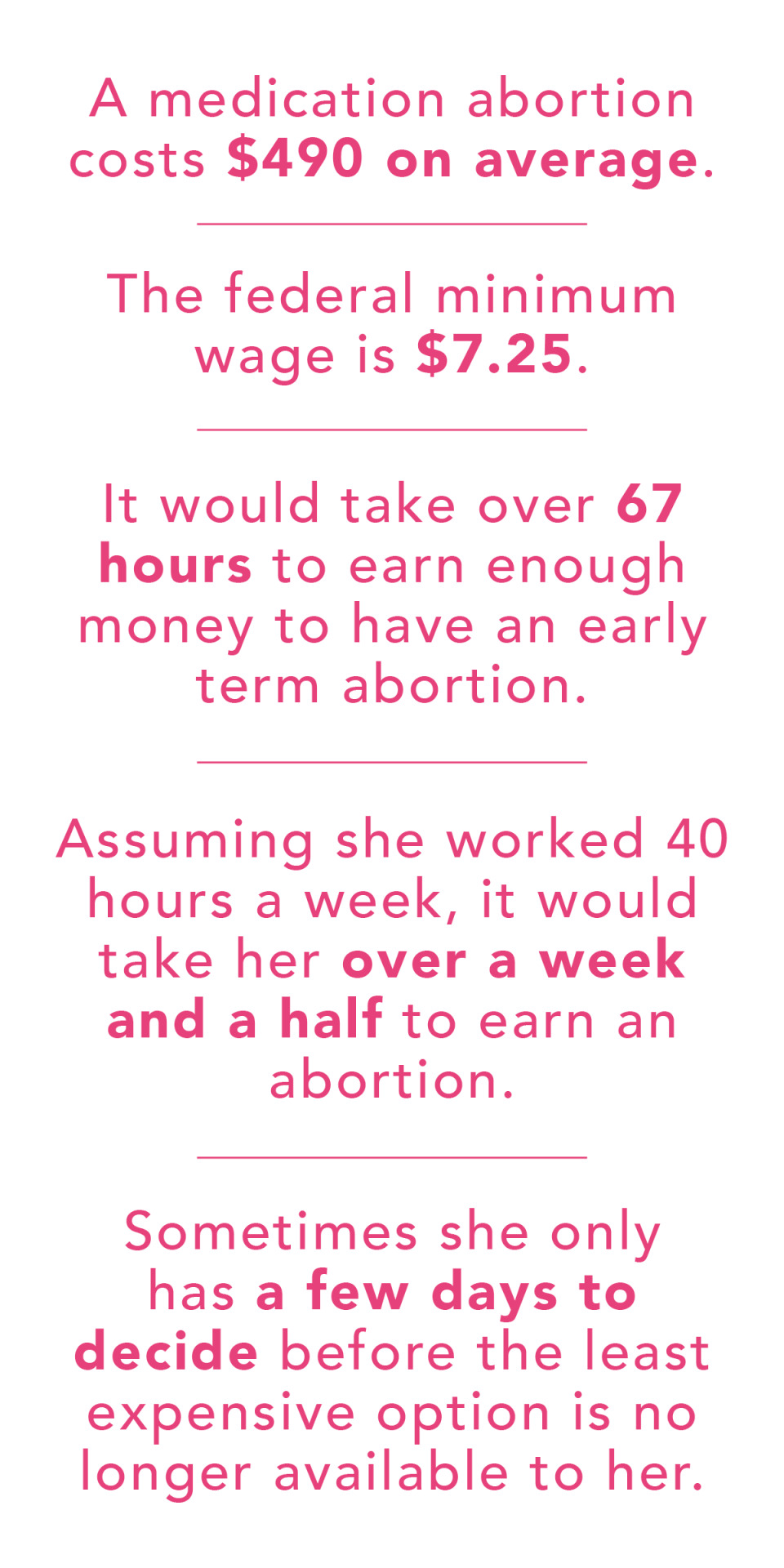
If you need financial assistance, call the National Abortion Federation at 800-772-9100. Please don’t let money stand in the way.
10K notes
·
View notes
Text
Help pls!
Hello, I’m Grace and I didn’t think I would have to do this but here we are. So, I have been living with my family and it’s been really bad for me and my mental health, my grandpa is rlly homophobic and racist and me, a chicanx lesbian, do not feel safe or comfortable living with him and that’s just one of the many issues. I just got a sudden and amazing offer for a place but they need the rent on 9/1 and it’s $600. I only have some of that right now and will also need food and transportation and money for copays for my therapy and other doctors visits coming up. So I’m in a bind and need help!!
If you could please check out commissions on my art blog peonyp-nk (will edit in link to the post later, I’m on mobile and don’t rlly know how lol) or just donate my PayPal is [email protected]. If not, please reblog! Sorry about this and thank you so so much.
198 notes
·
View notes
Photo
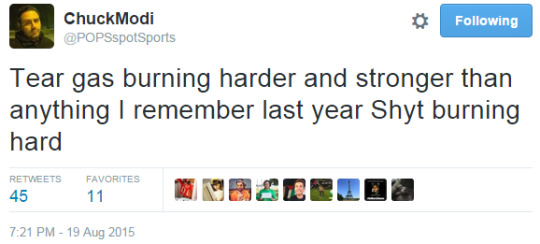
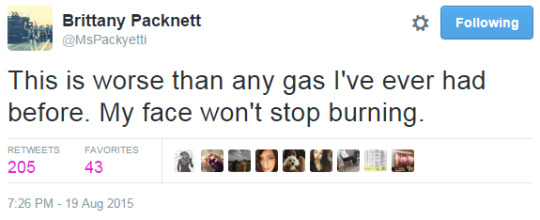
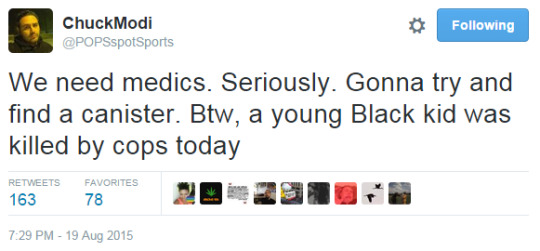
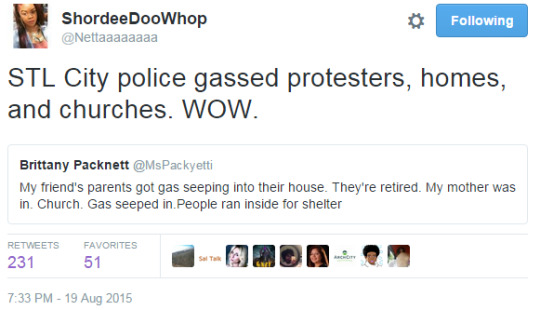

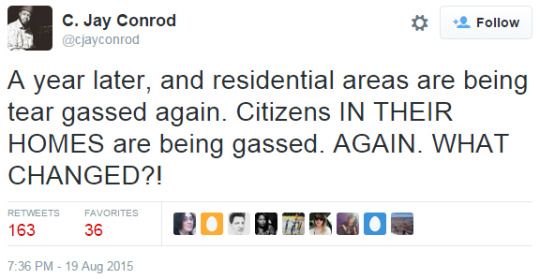
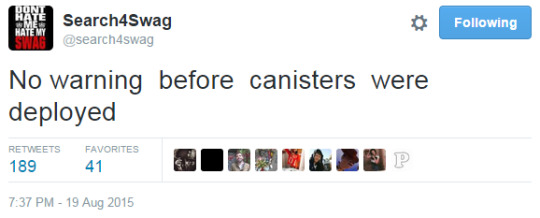
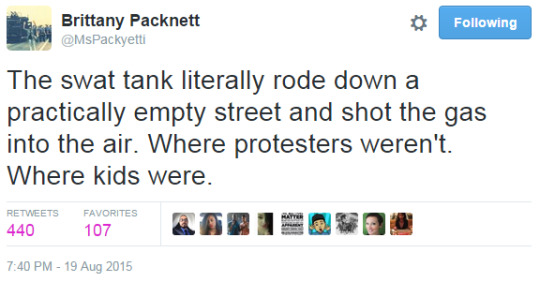
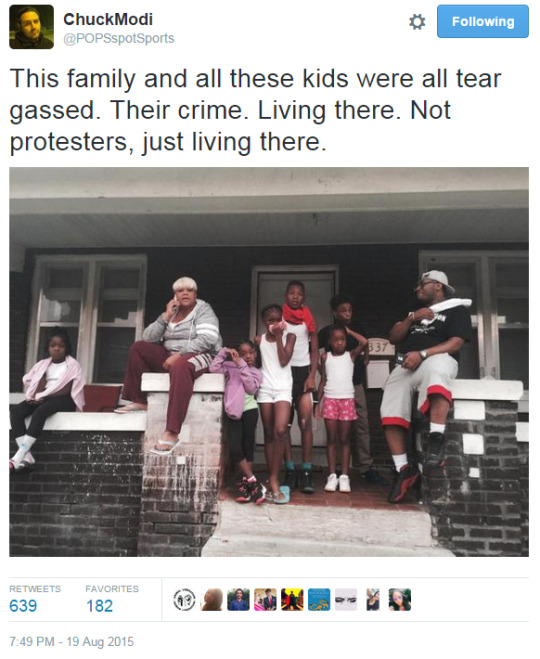
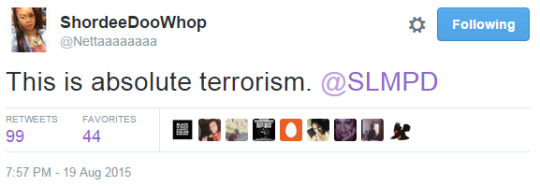
After killing a black teenager earlier in the afternoon, police gather by the dozen at the scene shortly before sunset and illegally use tear gas on peaceful protesters without warning. They shoot the gas indiscriminately, gassing homes, churches, and young children in the process.
Part Three
[Part One] [Part Two]
Wednesday, August 19, 2015
63K notes
·
View notes
